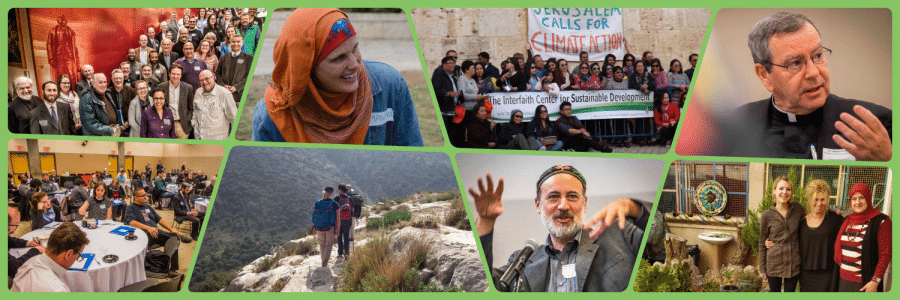Encounter: Interfaith Panels

We organize interfaith panels involving clergy or religious personalities from multiple faiths. The panels enable groups of students, tourists, or others to hear varied perspectives from distinguished people of faith living in the Jerusalem area.
Most panels are comprised of Muslim, Christian and Jewish representatives, but panels involving Bahai and/or Druse can be arranged upon request. After the panelists respond to questions from the moderator, participants can ask questions themselves to the panelists or share comments.
The overall theme of the panel and questions for the panels can be set in advance to fit the specific interests of the group. Possible themes include exploring how people of different faiths relate to:
- Coexistence
- Environmental sustainability and faith teachings
- Jerusalem as a holy city
- Stewardship of the Holy Land
The Interfaith Center for Sustainable Development has organized a range of interfaith panels for clients including the Arava Institute of Environmental Studies and Travcoa/Diesenhaus Unitours. Panelists have included priests, imans, rabbis, professors, and others from Jerusalem-based institutions such as the Swedish Theological Institute, Al Quds University, and the Tantur Ecumenical Institute. To read more about past interfaith panel events that our organization has arranged, focused on peace building and environmental leadership, click here .
Location: Jerusalem at the Jerusalem InterCultural Center on Mt. Zion
Length: 1 Hour
Cost: 1,300 NIS
Booking: Contact us via Email and send us your desired dates, number of people and other information that might be relevant to your event.
Note: Panel location, length and theme can be customized depending on your requirements. Please send us the details and we will be in touch.
Testimonials
“Our group participated in the interfaith panel as part of a larger trip throughout Jerusalem, seeing the city as a divided one in terms of history, religion, and ethnicity. I was skeptical about the panel as someone who doesn’t identify with any religion, but it helped to illuminate the importance of bringing religion into the conversation when discussing how to mend the breakages of this intensely divided city – even (or especially) for non-believers. In particular I was stunned by the eloquence of Yasmin Barhum and Rabbi Yonatan Neril, who were both able to articulate concisely and poignantly how sustainability and a care for the environment is anchored in their respective spiritual beliefs and practices. Yasmin even deftly wove in a political element, explaining to us that her belief in Islam helped to dictate what she felt was an appropriate pathway to political activism and involvement on the ground. I left the panel with a piqued and renewed interest in one’s spiritual practices and beliefs when addressing conflict, and the rest of our group seemed immersed in conversations to the same effect.
Through the emphasis on inter-religious cooperation, I believe that the environment can also act as a bridge between people of different faiths and cultures, opening a much needed dialogue about our shared future on this planet that we all care for. The Interfaith Center for Sustainable Development not only emphasizes the need for action and local environmental projects, but it also considers this need for an open dialogue between people of different faiths and belief systems. There is a strong focus on where we can all agree on environmental values and goals, but it also creates a space for more controversial issues or fundamental conflicts to be addressed and worked through in a diplomatic way, enriching each person’s understanding of the other’s point of view. It’s a space to learn from one another, but it’s also rooted in a shared desire to create solutions for the environmental problems we all must face together. Taking part in this panel reaffirmed, for me, the fact that there is meaning in this relationship between religion and the environment not only on a larger community scale, but also personally for myself, on an individual level. It reminded me that my passions and interests are relevant to the world today, and that I should continue to learn and grow in my understanding of how religious leaders, environmentalists, scientists, and members of a community can and should find a common ground to discuss these issues and develop pathways to a shared sustainable future.“
— Vanessa Gikas
Get in touch with us today and we will help you plan your trip!
Eco Israel Tours works with groups and individuals from around the world.
